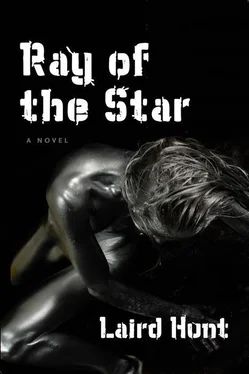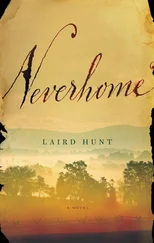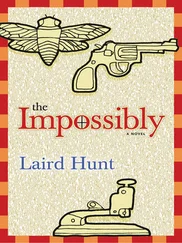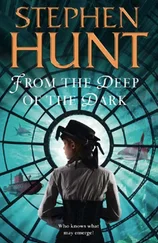The dead leaves that fell through Harry’s head in the café were of the same species as the ones that had been falling all that day through Doña Eulalia’s as she lay shivering under heavy quilts, attending to what she was convinced was a light fever but probably wasn’t — she had been a life-long hypochondriac — so that when, here and there, the letter “A” began appearing among the falling bits of gold and brown and red, followed by a series of, admittedly, barely visible L’s, F’s, S’s, N’s, and O’s, it took her quite some time to notice it, though when a golden horse holding a spear galloped through the downpour she sat straight up, threw off her quilts, reached for her phone and called Ireneo, who answered on the first ring, but in a hushed voice, so that she could barely hear him when he said,
“I am at my mother’s bedside, Madame,”
“Ah, and how is your mother?”
“She is gravely ill, Madame,”
“I’m terribly sorry to hear it, such a shame,”
“Yes, it is distressing, Madame,”
“What do you call those horses with human heads?”
“Madame?”
“Greek mythology, devilish things,”
“Centaurs, Madame, but you must forgive me, my mother …”
“Yes of course, I’m so sorry, go and see the centaur on the boulevard, the golden one, his name is Alfonso, he can tell you where to look,”
“It may be some days before I can return to the city to carry on my search, Madame,”
“Then you must go and look the moment you have returned,”
“I will, Madame, good-bye,”
“Just as soon as you have returned, make a note of it, Ireneo, and convey my best wishes to your mother, the poor woman, good-bye,” said Doña Eulalia, who emitted a loud “bollocks!” as soon as she had shut her phone, and for a moment she considered asking one of the others to run the errand, but they were all — these relatives of hers — useless, not much better than the mannequins on rollers she had them drag around on the nights she had her clients over, a scheme Ireneo, the only one not related to her, had helped her come up with in order to double the number of lamps and faces — those brief, bright pools of mystery — present at her consultations, without having to reach further beyond the unpaid ranks of her family, all of whom worked for her gratis, in expectation of an inheritance … no, it would have to be Ireneo, and she would have to wait, she thought there was still time, “but time for what?” she asked herself as she climbed back into bed, covered herself, reached for a thermometer, looked for the leaves to see if anything else was galloping around in them, found that her head was empty, said, “bollocks!” again, and promptly fell asleep.
Which was just what Ireneo, who had been more or less awake since he had arrived some days previously, wished he could do, but every time his head began to loll his mother, who had a platoon of servants at her command but wanted only him, would moan as if on cue, and Ireneo’s hand would go out and damp her forehead with a washcloth or squeeze a little water between her lips, and when, in a faltering, unenthusiastic voice she would ask him to sing, he would produce warbling, incomplete versions of songs she had taught him during his boyhood and made him perform, in a wig and short pants, along with a few poorly executed dance steps, in front of her employees at the factory during Christmas parties, while his father, who had drunk himself to death before Ireneo had turned ten, gazed on in poorly concealed disgust, a look which years later had found its echo on his mother’s face when he had told her he had no interest in taking up a position in her company, and that, instead, he had decided to go “into the occult,” a field in which if one sold one’s soul at least it was on one’s own terms, and which, if less remunerative, had significant and lasting rewards, a stance that Ireneo had continued to maintain, even though, thus far, his role remained a supporting one, after all even now as he sat by his mother’s bed the old running shoes, which he had gone so far as to sleep (if not bathe) in, continued to give off promising sparks of import that he very much looked forward to being able, again, to give his full attention to, in the way, as he saw it, Doña Eulalia paid attention to the bits and pieces of information that came to her, at all hours of the day and night, which focus allowed her, most of the time, to make something like sense out of not very much at all, a skill that Harry, a few hours later, would have been very happy to have had a little of, as against his better judgment, he negotiated the gray and violet streets of the pre-dawn city on his way to Alfonso’s, while at the same time continuing to think of the young woman on the plane with her book on the Black Dahlia, the man with his new golf balls, Señora Rubinski, Ireneo, Doña Eulalia with the lamp on her head, the connoisseurs, Alfonso, Solange, the young man with the knife blade in his throat, all of which had seemed to him, as he drank glass after glass of sparkling water at his kitchen table and watched the clock hands tick ever closer to this ridiculously awkward hour, like so many inexplicable blocks of ice bumping against each other on the black water that, since hearing the story of the silver angel, he had off and on been doing a dog-paddle in, any one of which he would have gladly clambered onto and taken his chances on, not least the one that corresponded to Señora Rubinski and Señora Rubinski’s dead husband, whom the excellent lady had, that very evening upon his return from the café, described as they stood a moment together on the sidewalk as a most marvelous and thoughtful individual, one with whom one “always had the very best chances of passing an agreeable moment,” an image that had touched Harry greatly, with the result that he had remained out on the sidewalk with Señora Rubinski for quite some time indeed, so long in fact that when Señora Rubinski announced with a sigh and a shake of her head that her husband, “a bit of a lazybones,” must have fallen asleep on the couch, and that she would have to go and wake him, even though it was now far too late for them to begin their customary walk, Harry was able to offer her his arm and escort her to the elevator and, as tears began to drip down her cheeks, hand her the stray makeup-removal cloth that was still neatly folded in his front pocket, which she very elegantly used to dab at the corners of her eyes then, with a slight bow, returned to him, and as he had climbed the stairs to begin waiting to go see Alfonso, it seemed very nearly certain to him that despite the leaning of his spirits of late, Señora Rubinski’s tears were about to have company, that they could not help but have company, and that this would be a good thing, for it had been a very long time, but the only tears in Harry’s apartment that night were Señora Rubinski’s, and of course in spite of the sparkling water that Harry found he could not stop drinking and the horrible black water it seemed to him he kept slipping below the surface of, before long the cloth that had contained them was completely dry.
Harry could not have said whether it was some trick of perception to do with the trend of his thoughts, or a pocket of unusual local phenomenon that he had stumbled into, but as he approached Alfonso’s coordinates, the streets of the city, described above as gray and violet, went black then blacker, and for a moment, even though he could see quite clearly, he felt himself compelled to hold his hands pressed against his thighs, flare his nostrils, and flick his eyes back and forth as if something — possibly the air itself and how the fuck could he fight the air — was about to spring and shove a blade down his throat, or otherwise finish the job on him, what a night, what a night, but presently a cheery row of lampposts cut a series of lovely cones in the darkness and, just beyond them, he began to hear bits and pieces of birdsong, which grew stronger as he moved forward, and before very long at all he had found the address he had been looking for, pressed the intercom buzzer, and been admitted into a kind of loft by Alfonso, who, scraped clean of his gold, looked small, distinctly plump and kind, so kind that Harry, a little discombobulated and, frankly, grateful to be suddenly bathed in light, warmly pressed Alfonso’s hand before accepting a large mug of coffee and a clap on the shoulder, and for a long moment he just stood there taking in the high ceiling, the crumbling paint, the wood stove in one distant corner, the black-and-white photographs of the city, interspersed with what looked like old maps of the continents and fanciful coastlines, hanging on the walls, the piles of scrap wood here and there and the large, clean-but-paint-spattered floor, drifting, as he did so, into the kind of stupor that abrupt changes in circumstance, especially those involving shifts in temperature or quality/quantity of light rarely fail to engender, and it was only when Alfonso, speaking over his own mug of coffee, said, “I have something to show you,” that Harry remembered what it was he had planned to say as soon as he arrived—“There are several things I’d like to ask you, Mr. Centaur,”—but instead he found himself murmuring, “It’s very dark out,” and following Alfonso to the far side of the room, and through a narrow blue door that gave onto what it took Harry a moment to realize was a garage of sorts, perhaps even — the stone seemed weathered enough — an old carriage house, in the center of which sat a large yellow submarine, more or less the one The Beatles had had their adventure in, the one that had been so useful in the struggle against the blue meanies, the one connected to the song, which he had never liked very much and which now raged very nearly out of control in his head before subsiding, slightly, then more fully, like someone had thrown a fade switch, “You can get inside it,” Alfonso said,
Читать дальше












